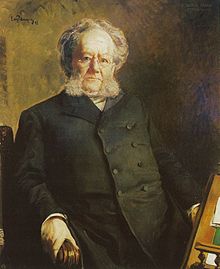
Back Henrik Ibsen Afrikaans Henrik Ibsen ALS Henrik Ibsen AN هنريك إبسن Arabic هينريك ايبسين ARZ হেনৰিক ইবছেন Assamese Henrik Ibsen AST Henrik İbsen Azerbaijani هنریک ایبسن AZB Генрик Иоган Ибсен Bashkir
Henrik Ibsen | |
|---|---|
 Portrait by Eilif Peterssen, 1895 | |
| Born | Henrik Johan Ibsen 20 March 1828 Skien, Telemark, Norway |
| Died | 23 May 1906 (aged 78) Kristiania, Norway (modern Oslo) |
| Occupation | Writer, theatre director |
| Genres | Drama |
| Literary movement | Naturalism, realism |
| Notable works | Brand (1865) Peer Gynt (1867) A Doll's House (1879) Ghosts (1881) An Enemy of the People (1882) The Wild Duck (1884) Rosmersholm (1886) Hedda Gabler (1890) |
| Spouse | Suzannah Thoresen (m. 1858) |
| Children | Sigurd Ibsen |
| Relatives | Knud Ibsen (father) Marichen Altenburg (mother) |
| Signature | |
Henrik Johan Ibsen (/ˈɪbsən/;[1] Norwegian: [ˈhɛ̀nrɪk ˈɪ̀psn̩]; 20 March 1828 – 23 May 1906) was a Norwegian playwright and theatre director. As one of the founders of modernism in theatre, Ibsen is often referred to as "the father of realism" and the most influential playwright of the 19th century, as well of one of the most influential playwrights in Western literature more generally.[2] His major works include Brand, Peer Gynt, Emperor and Galilean, A Doll's House, Ghosts, An Enemy of the People, The Wild Duck, Rosmersholm, Hedda Gabler, The Master Builder, and When We Dead Awaken. Ibsen is the most frequently performed dramatist in the world after Shakespeare,[3][4] and A Doll's House was the world's most performed play in 2006.[5]
Ibsen was born into the merchant elite of the port town of Skien, and had strong family ties to the families who had held power and wealth in Telemark since the mid-1500s.[6] He was raised as a member of the tightly intertwined Ibsen–Paus family and described his own background as patrician.[6] Ibsen established himself as a theater director in Norway during the 1850s and gained international recognition as a playwright with the plays Brand and Peer Gynt in the 1860s. From 1864, he lived for 27 years in Italy and Germany, primarily in Rome, Dresden, and Munich, making only brief visits to Norway, before moving to Christiania in 1891. Most of Ibsen's plays are set in Norway, often in bourgeois environments and places reminiscent of Skien, and he frequently drew inspiration from family members. Ibsen's early poetic and cinematic play Peer Gynt has strong surreal elements.[7] After Peer Gynt Ibsen abandoned verse and wrote in realistic prose. Several of his later dramas were considered scandalous to many of his era, when European theatre was expected to model strict morals of family life and propriety. Ibsen's later work examined the realities that lay behind the façades, revealing much that was disquieting to a number of his contemporaries. He had a critical eye and conducted a free inquiry into the conditions of life and issues of morality. In many critics' estimates The Wild Duck and Rosmersholm are "vying with each other as rivals for the top place among Ibsen's works";[8] Ibsen himself regarded Emperor and Galilean as his masterpiece.[9]
Ibsen is often ranked as one of the most distinguished playwrights in the European tradition,[10] and is widely regarded as the foremost playwright of the nineteenth century.[10][11] Ibsen influenced other playwrights and novelists such as George Bernard Shaw, Oscar Wilde, and James Joyce. Considered a profound poetic dramatist, he is widely regarded as the most important playwright since Shakespeare.[12][13] Shaw claimed that the new naturalism of Ibsen's plays had made Shakespeare obsolete.[14] Ibsen is commonly described as the most famous Norwegian internationally.[15]
Ibsen wrote his plays in Dano-Norwegian,[a] and they were published by the Danish publisher Gyldendal. He was the father of Prime Minister Sigurd Ibsen.
- ^ "Ibsen". Random House Webster's Unabridged Dictionary.
- ^ On Ibsen's role as "father of modern drama", see "Ibsen Celebration to Spotlight 'Father of Modern Drama'". Bowdoin College. 23 January 2007. Archived from the original on 12 December 2013. Retrieved 27 March 2007.; on Ibsen's relationship to modernism, see Moi (2006, 1–36)
- ^ "shakespearetheatre.org" (PDF). Archived from the original (PDF) on 14 February 2019. Retrieved 25 January 2013.
- ^ "Henrik Ibsen – book launch to commemorate the 'Father of Modern Drama'". Archived from the original on 19 September 2016. Retrieved 25 January 2013.
- ^ Bonnie G. Smith, "A Doll's House", in The Oxford Encyclopedia of Women in World History, Vol. 2, p. 81, Oxford University Press
- ^ a b Cite error: The named reference
Haavewas invoked but never defined (see the help page). - ^ Klaus Van Den Berg, "Peer Gynt" (review), Theatre Journal 58.4 (2006) 684–687
- ^ McFarlane, James (1999). "Introduction". In: Ibsen, Henrik, An Enemy of the People; The Wild Duck; Rosmersholm. Oxford World Classics. Oxford, England: Oxford University Press. p. ix. ISBN 0192839438, ISBN 9780192839435.
- ^ Peter Normann Waage (1986). "Henrik Ibsen og Keiser Julian". Libra.
- ^ a b Valency, Maurice. The Flower and the Castle. Schocken, 1963.
- ^ Byatt, AS (15 December 2006). "The age of becoming". The Guardian. London.
- ^ Valency, Maurice. The Flower and the Castle. Schocken, 1963.
- ^ Richard Hornby, Ibsen Triumphant, The Hudson Review, Vol. 56, No. 4 (Winter, 2004), pp. 685-691
- ^ Grady, Hugh (2001b). "Shakespeare criticism, 1600–1900". In de Grazia, Margreta; Wells, Stanley (eds.). The Cambridge Companion to Shakespeare. Cambridge: Cambridge University Press. p. 276. doi:10.1017/CCOL0521650941.017. ISBN 978-1-139-00010-9. OCLC 44777325.
- ^ Cite error: The named reference
Nygaard-foredragwas invoked but never defined (see the help page).
Cite error: There are <ref group=lower-alpha> tags or {{efn}} templates on this page, but the references will not show without a {{reflist|group=lower-alpha}} template or {{notelist}} template (see the help page).
© MMXXIII Rich X Search. We shall prevail. All rights reserved. Rich X Search